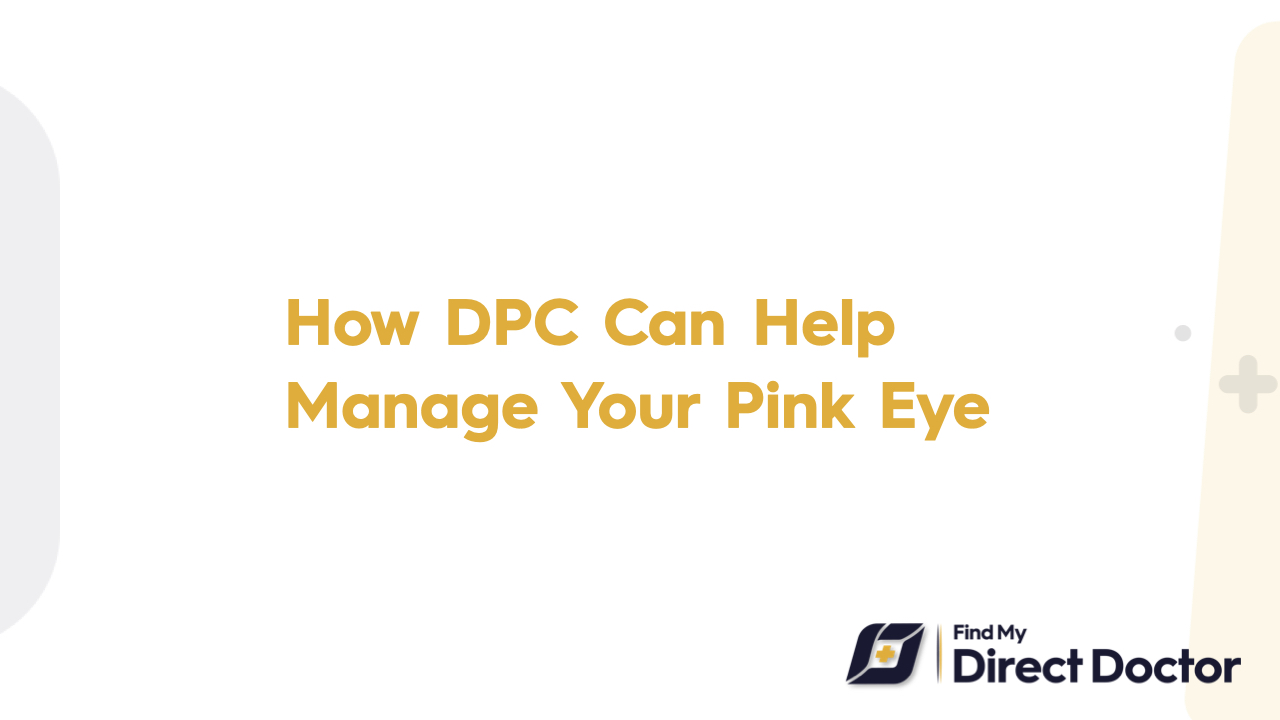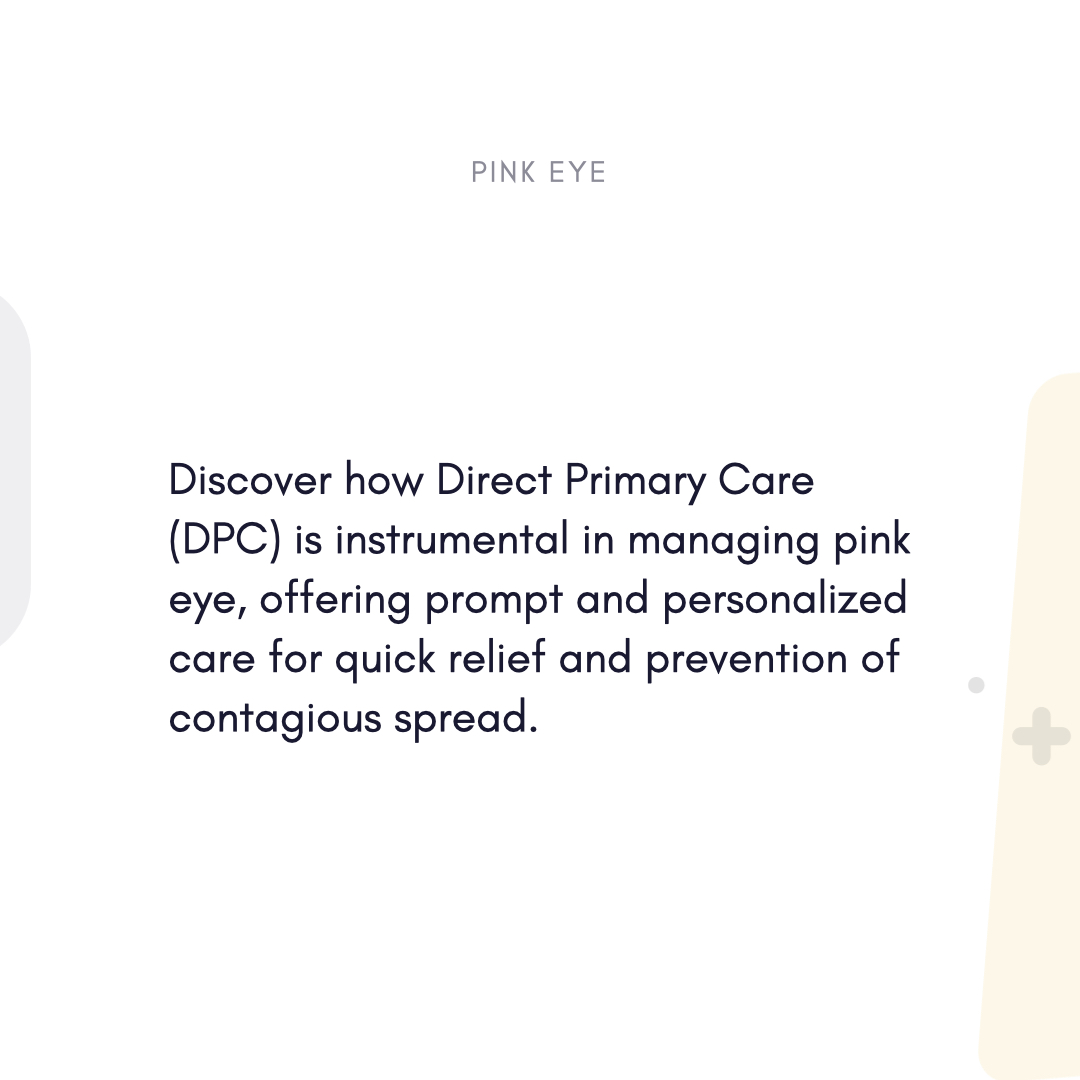Pink Eye and Direct Primary Care (DPC): Fast, Affordable Relief Without the Wait
Red, irritated eyes burning with every blink. Every morning, crusty lashes that bind your eyes closed. Every year, six million Americans with pink eye—conjunctivitis—have their daily life, school, and employment disrupted. Traditional treatment sometimes entails paying hefty urgent care costs or waiting days for appointments. There is hope, though: Direct Primary Care (DPC) provides quick, customized treatment to rapidly and affordably clear pink eye.

Gaining Knowledge of Pink Eye
Conjunctival inflammation known as pink eye results from:
- Most often occurring and quite contagious are viruses.
- Thicker yellow discharge from bacteria calls for antibiotics.
- Allergies—itchy, watery eyes, usually seasonal—also affect.
There are symptoms including:
- Redness, irritation, or burning
- Release (clear, white, or yellow-green)
- Either light sensitivity or swollen eyelids
Delayed care's risks include:
- Corneal ulcers, or bacterial cases,
- Distributed among classmates or household members
- Antibiotics used improperly for viral infections
According to the American Academy of Ophthalmology, quick assessment is advised to direct suitable treatment.
DPC Changes: Pink Eye Treatment
Operating on a membership model usually ranging from 50 to 100 USD per month, Direct Primary Care (DPC) provides unlimited access to your doctor for a fixed price. For those with pink eye, this means no insurance hassles, no co-pays, and a treatment schedule as rapid as your symptoms call for.
1. Relief from Same-Day Diagnosis
The easily available DPC model guarantees:
- Instant redness or discharge evaluation.
- Fluorescein staining in-office to rule out corneal abrasions.
- Correct diagnosis: separating allergic, bacterial, or viral causes.
2. Customized, Evidence-Based Therapies
DPC doctors create customized strategies:
- Prescription antibiotic drops—such as moxifloxacin—or ointments—for bacterial cases.
- Soothing with cold compresses, antihistamine drops, and hygienic advice helps with viral cases.
- Cases of allergies: oral antihistamines or drops of oopatadine.
3. All-Around, Reasonably Priced Assistance
DPC lowers financial and contagious risks by:
- Medication costs: Wholesale pricing for ketotifen or erythromycin ointment.
- 24/7 telehealth access: Remotely evaluating symptoms helps prevent clinic spread.
- Teaching correct contact lens hygiene or allergen avoidance helps preventative education.
DPC Advantages for Pink Eye Patients
1. One Has Unmatched Accessibility.
- 24/7 provider access to triage contagiousness via photo uploads.
- There are no wait times for follow-up notes or school/job notes.
2. Individualized Treatment
- Children less than adults: Children's friendly ointments or preservative-free drops for delicate eyes.
- Wearers of contact lenses: Direct advice on immediate cessation to avoid corneal ulcers.
3. Open Cost: Transparency
- Membership covers exams, prescriptions, follow-ups—no hidden costs.
- Typical savings: 200+ USD each infection by skipping mark-ups and urgent care co-pays.
Personal Success Stories from Real Life
- First case: 28-year-old Sarah woke with glued-shut eyes. Her DPC doctor emailed a work note, diagnosed bacterial conjunctivitis, wrote moxifloxacin prescriptions via telehealth. 48 hours later, symptoms went away.
- Case 2: Ethan, 7, experienced pollen season eye itching. His DPC provider recommended hypoallergenic pillowcases, prescribed ketotifen drops, and taught handwashing songs. Flares fell by eighty percent.
Frequencies: DPC and Pink Eye
- Can DPC manage severe cases including vision changes?
- A: Yes. Often securing cash-pay discounts, DPC doctors refer same-day to ophthalmologists for corneal problems.
- Q: Can uninsured families afford DPC?
- A: Definitely. Members avoid 150+ USD annual urgent care expenses per child and save on medications.
- Q: Should I be testing for allergies?
- A: DPC doctor schedules skin prick or IgE blood tests at agreed upon rates.
Why DPC Benefits Patients With Pink Eye
Emphasizing DPC's alignment with conjunctivitis guidelines, the American Academy of Family Physicians supports:
- Accuracy: Correct diagnosis helps to lower antibiotic overuse.
- Preventing outbreaks with customized cleaning schedules.
- Trust: A consistent care team substitutes for disjointed, expensive visits.
Clear Up Pink Eye Fast—Without the Fuss
Pink eye does not have to mean days of suffering or missed work. DPC helps you find a partner who moves quickly, writes smart prescriptions, and prepares you to safeguard the eye health of your family.






